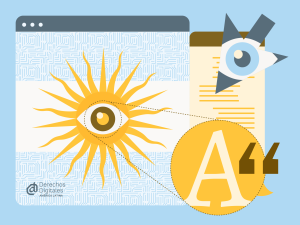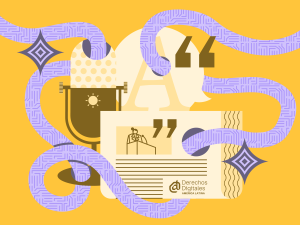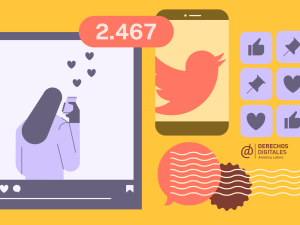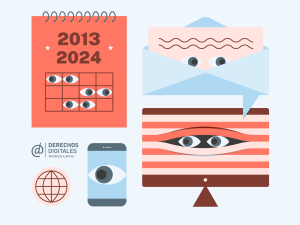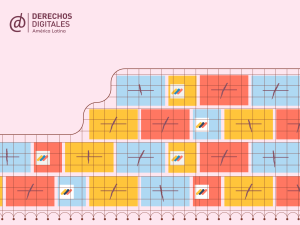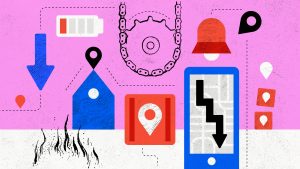Choose language:
The challenge of building the future of human rights
Sustaining a civil society organization dedicated to promoting human rights in Latin America is no easy task. This milestone deserves to be celebrated, even in a global context that seems determined to take away any brief moments of joy. On this date marking the formal founding of Derechos Digitales 20 years ago, we look back at our roots and renew our commitment to continuing the struggle for a fairer, more equitable, and more democratic future.
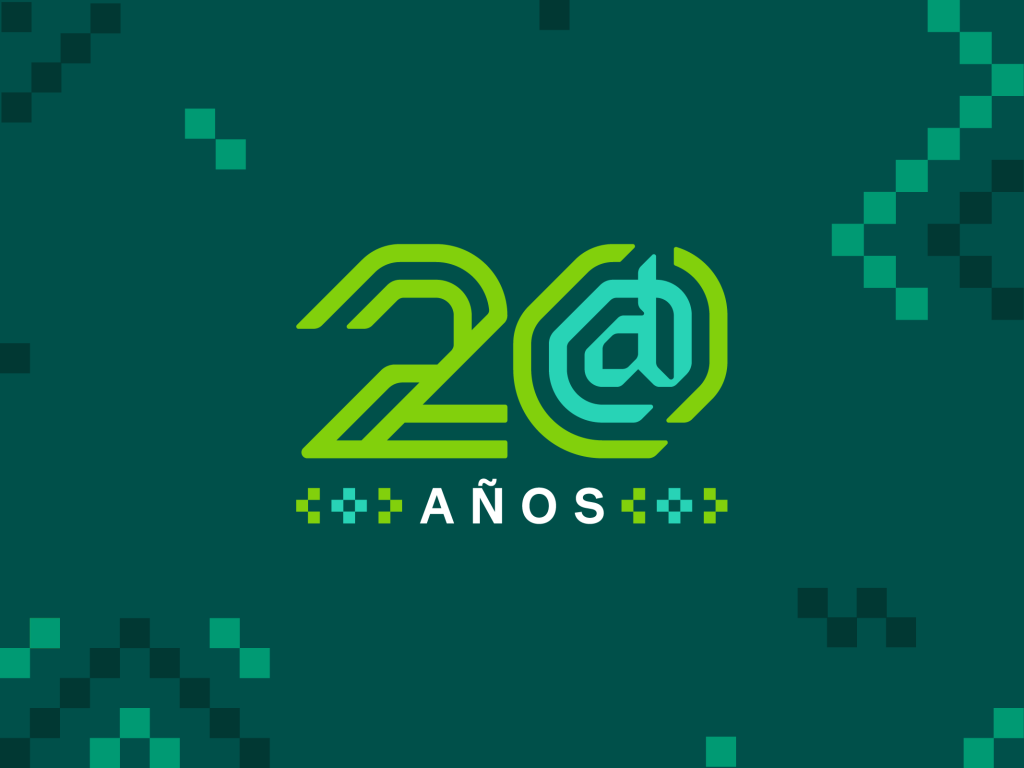
The story of Derechos Digitales began two decades ago with a shared belief: that technology would help democratize the exercise of a set of human rights from which much of our population was excluded. In particular, the rights to freely access and share artistic, cultural, and scientific-academic content, as well as news and opinions on a wide range of topics. We began our activism by defending these freedoms in the digital sphere, ensuring that no technical or legal barriers were imposed on access. Instead, we sought new frameworks to protect and develop our digital rights.
Although our origins took shape more than a decade after the democratic opening in most Southern Cone countries paved the way for similar social initiatives, we based our work on their struggles and achievements, as well as on the reflections and progress of movements that had begun years earlier. Rather than starting from scratch, we started with a map that already showed areas of conflict, potential alliances, and paths to explore.
A story built on dreams of freedom
Our most obvious connection is with the “free culture” movement, since we were responsible for adapting and promoting Creative Commons licenses in Chile. We share with them a resistance to the unchecked expansion of intellectual property as a mechanism for controlling the circulation of digital content and protecting old cultural and media monopolies. However, this movement also draws strong inspiration from two earlier movements: one centered on free software and another that emerged from the struggle for open access to knowledge, particularly access to scientific literature.
The first text on our current website, dated May 5, 2005, reflects this foundational connection. Its title: What is free software? It concluded:
“Considering the licensing policies imposed by proprietary solutions, which tend to undermine citizens’ freedoms, the benefits of collaborative work and the incentive for national development, and the costs associated with implementing open-source software solutions, Derechos Digitales firmly supports free or open-source software.”
Another example of this connection with more traditional human rights movements is a text from the same month by Daniel Álvarez Valenzuela, the founder and then-director of Derechos Digitales. According to Álvarez Valenzuela, the internet could “provide ordinary citizens with the same opportunities to exercise their right to freedom of expression as those held by large economic groups.”
By arguing that intellectual property represented a “gag” on freedom of expression, Álvarez revived the demands of freedom of expression and communication rights activism in Latin America. These movements were responsible for denouncing state censorship and challenging the economic monopoly of the media in our region.
Our earliest texts reflected connections with issues of interest to various groups, including transparency and access to information, access to justice, and data protection, among others. While these references broadened the conceptual framework from which we approached digital issues, our alliances and ways of working remained closely linked, primarily to technical and legal communities, for a long time. Thus, for many years, our work occupied a niche within the broad scope of human rights activism.
Hijacked promises
Over our 20 years of activity, we have deepened our understanding of these foundations, always striving to protect the exercise of technology-enabled rights from attempts at capture, criminalization, and surveillance. What used to be a technical and legal discussion limited to a digital space accessible only to a small regional elite is now at the heart of the daily concerns of countless people affected in different ways by digital technologies.
First, internet access has increased significantly in the region, albeit unevenly and often under precarious conditions. The gaps are not only in infrastructure but also in quality, affordability, and autonomy. Many connections are slow, unstable, or costly, and much of the access happens exclusively via mobile phones with restrictive data plans that violate net neutrality principles. Moreover, profound inequality remains in access to adequate devices and the skills needed to use the internet safely, critically, and in ways that support the exercise of rights. Disconnection is no longer the only problem; limited, dependent, and unreliable connectivity are also issues.
Second, because it is no longer necessary to “be” online to feel the effects of digitalization, which—despite the eternal promise of efficiency—seems to have brought more risks than benefits, digitalization now shapes access to essential services like health, education, and justice, yet often without adequate safeguards for everyone. These transformations, usually driven by private actors without transparency or democratic oversight, or dazzled by the promise of artificial intelligence, ultimately deepen inequalities and create new forms of exclusion. While data filtering and cybersecurity were once central concerns, we must now consider their tangible consequences: the violence and manipulation of digital public debate and their impact on our lives and societies. The issue is no longer just access to information; it’s also about the possibility of participating in the public sphere without being silenced, harassed, or manipulated.
Third, because our bodies are captured and turned into exploitable digital traces for purposes beyond our consent, as digital technologies are applied to mediate our access to spaces and the exercise of our rights. The expansion of biometric identification systems, activity monitoring, and predictive analytics has turned our lives into data to be exploited and our digital footprints into raw material for social control, automated discrimination, and the extraction of value. What was once understood as technological mediation now operates as a filter, barrier, or condition for access to life in society.
The original promises of openness, decentralization, and access that inspired the emergence of this field have been systematically displaced by dynamics of concentration, extraction, and control that define contemporary digital infrastructures.
Given these conditions, the digital environment is no longer a naturally conducive space for exercising rights. What was once fertile ground for imagining new freedoms now presents more urgent and unequal challenges that are increasingly difficult to reverse. However, if there is one thing we’ve learned over the past twenty years, it is that conflict does not close off possibilities; instead, it forces us to rethink our work.
For the right to dream
Despite these significant changes, and in an international geopolitical context that is hostile to human rights narratives, we believe more than ever that it is essential to reaffirm our mission, not as a repeated slogan, but as a task that constantly redefines itself in the face of more sophisticated threats, more powerful actors, and deeper forms of exclusion. The landscape we face is often hostile, but also increasingly contested: more and more cracks are revealing a diversity of voices demanding justice. Voices that need safe spaces and enabling environments, even in digital spaces, to continue expressing themselves.
Twenty years after our founding, we continue to bet on free software to ensure freedom, autonomy, and protection. We remain convinced of the need to democratize communications and break up monopolies that reinvent themselves daily at the expense of our communities’ freedom. Now more than ever, we believe that human rights are a living tool to confront today’s crises and help shape the future.
The coming years will demand more than resistance; we will require new alliances, new forms of advocacy, and a broader understanding of what it means today to defend rights in digital environments. We will need resilience and solidarity. From the margins where we work as Latin American civil society — and across the region — we know that reacting is not enough; we need to propose the future we want. This will remain our stance.
































